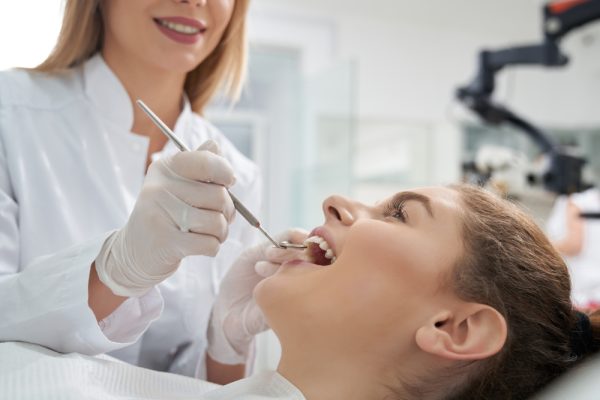Achieve a Healthy Mouth and Smile With Regular Dental Exams
Imagine a future where tooth decay, gum disease, and other oral health problems are a distant memory. This future is possible through regular dental exams, which play a crucial role in maintaining your oral health and preventing future issues.
Our Fort Wayne dentist explores the importance of dental exams, ensuring that you understand how they’re beneficial for your dental hygiene and unique smile.

The Importance of Dental Exams
Dental exams are critical for maintaining oral health and avoiding potential issues in the future. The American Dental Association recommends having a dental exam at least once a year, or as advised by a dental hygienist or dentist depending on the condition of your oral cavity. Dental exams include a comprehensive assessment of teeth and gums, allowing the dentist to detect any indications of tooth decay, gum disease, or other health issues that may not be visible to the naked eye.
The benefits of undergoing regular dental exams are numerous, including early detection of problems when treatment is more likely to be effective, simpler, and cost-efficient. Routine dental exams help prevent the development of various dental issues, such as cavities and gum infections. By investing in regular dental checkups, you’re investing in your overall health and well-being.
Components of a Comprehensive Dental Exam
A comprehensive dental exam involves evaluating oral health, detecting dental issues, and obtaining X-rays and imaging. The dentist and dental hygienist will conduct a thorough cleaning of your teeth and examine your mouth for any potential issues. Additionally, they’ll review your medical history to ensure that no complications arise during treatment.
During a dental exam, several methods are employed to diagnose dental problems. These methods ensure that a comprehensive record of the entire oral cavity is created, providing a baseline for future exams and helping to identify any changes in oral health.
Assessing Your Oral Health
Assessing your oral health is essential during a comprehensive exam, as it helps identify potential issues that may be present without any noticeable symptoms or signs, such as pain or discoloration. A dentist will visually inspect your mouth, checking for decay, stains, areas around the gum line to detect any gum recession, and the margins around any existing fillings or crowns.
The dentist will evaluate your bite alignment and jawbones, looking for indications of jaw clenching or worn grooves on the teeth. A periodontal disease evaluation will be performed to assess the occurrence and intensity of gum disease, focusing on periodontal pockets, which are spaces between the top of the gum line and the soft tissue that secures a tooth in place.
If these pockets measure deeper than three millimeters, they may be indicative of gum disease (periodontitis).
Identifying Dental Issues
Identifying dental issues is a crucial part of a comprehensive dental exam. Common dental problems include tooth decay, periodontal disease, oral cancer, tooth overcrowding, and impacted teeth. During the oral exam, the dentist will look for signs of misalignment, bruxism (teeth grinding), and TMJ (temporomandibular joint) disorders.
A TMJ examination assesses the temporomandibular joint for any potential problems. By detecting and diagnosing dental issues early, it’s possible to prevent them from becoming more severe and potentially leading to tooth loss or other health problems.
Dental X-rays and Imaging
Dental X-rays and imaging are essential components of a routine dental exam, as they provide insight into hidden cavities, gum disease, bone loss in the jaw, and other oral health issues that aren’t visible during a visual examination. Dental X-rays are a type of imaging that utilizes a minimal amount of radiation to generate images of the interior of the mouth.
The purpose of taking X-rays during a comprehensive oral exam is to establish a baseline reading of the entire mouth and to identify any changes in oral health. While dental X-rays are generally safe for the majority of individuals, some exceptions, such as pregnancy, may require special consideration.

Professional Teeth Cleaning and Maintenance
Professional teeth cleanings and maintenance are an integral part of dental exams, as it helps preserve oral health and prevent tooth decay and gum disease. During the cleaning process, the dentist or dental hygienist will remove plaque and tartar buildup from the teeth and gum line using small metal tools, and then polish the teeth to create a smoother surface. Smoothing the teeth reduces the chances of plaque adhering to them between dental visits.
In addition to routine cleanings, other various dental care procedures play a crucial role in maintaining your oral health. These may include fluoride treatment, oral hygiene education, and scaling and root planing for those with gum disease.
Fluoride Treatment
Fluoride treatment is a dental procedure where a dentist or dental hygienist applies fluoride to a patient’s teeth to strengthen them and help prevent cavities. Fluoride aids in the prevention of tooth decay by making the tooth more resistant to acid attacks from plaque bacteria and sugars present in the mouth. It’s an essential dental care treatment that’s been employed for decades and is particularly beneficial for those at high risk of developing dental caries or cavities.
During the fluoride treatment process, the dentist will apply a fluoride gel, foam, or varnish to the teeth, which will then remain on the teeth for a few minutes before being rinsed off. Fluoride treatment has been shown to strengthen teeth and reduce the incidence of cavities, as well as reverse early signs and symptoms of tooth decay.
Oral Hygiene Education
Oral hygiene education is the process of providing instruction on how to practice proper oral hygiene, including regular brushing and flossing habits, routine dental examinations, and the utilization of mouthwash. Brushing and flossing daily can help remove plaque and food particles from the teeth and gums, reducing the risk of tooth decay and gum disease.
A routine dental exam facilitates the early detection and prevention of oral health issues before they become significant. Using mouthwash can assist in diminishing plaque and bacteria in the mouth, as well as providing fresher breath, and reducing the likelihood of gum disease and tooth decay.
By incorporating proper oral hygiene practices into your daily routine, you can maintain a healthy mouth and smile for years to come.
Scaling and Root Planing
Scaling and root planing, commonly referred to as deep cleaning, is a dental procedure that involves the removal of tartar and bacteria from teeth and gums to treat gum disease and prevent further progression. Not everyone will need scaling and root planing, as it’s only performed on those with gum disease.
The process consists of two stages: scaling and root planing.
During scaling, a scaler is employed to remove plaque and tartar from the surface of the teeth. Root planing follows, during which a special instrument is utilized to smooth the root surfaces of the teeth, preventing bacteria from accumulating and causing further damage.
Scaling and root planing can help decrease inflammation and bleeding of the gums, as well as reduce the likelihood of gum disease advancing to more serious conditions like periodontitis. The procedure is typically not painful, as it’s usually accompanied by the administration of a local anesthetic to the soft tissue to reduce any potential discomfort.
Oral Cancer Screenings and Early Detection
Oral cancer screenings and early detection are critical components of a routine dental exam. An oral cancer screening exam involves a visual examination of the soft tissue to identify suspicious lesions, lumps, discolorations, or other areas of concern. This screening helps identify and detect any potential abnormalities on the tissue that can’t be detected during a standard oral examination.
Individuals who possess factors that may elevate their risk of oral cancer should consider specialized cancer screenings. Early detection of oral cancer significantly improves the survival rate, making it crucial to include oral cancer screening as part of your regular dental checkups.
Special Considerations for Children and High-Risk Patients
When scheduling a dental exam, it’s essential to take into account any special considerations for children and high-risk patients. For children, a comprehensive examination of the teeth, jaws, bites, gums, and oral tissues should be conducted to evaluate growth and development. The American Dental Association recommends that your child should have their first dental appointment within six months of getting their first tooth, or by their first birthday.
For high-risk patients, it’s important to assess any underlying medical conditions that may affect their oral health, take note of any medications they’re taking that may affect their oral health, and be aware of any allergies they may have that could affect their oral health. By considering these factors, dentists can provide a more personalized and effective dental exam experience for every patient.
Preparing for Your Dental Exam
To ensure you’re prepared for your dental exam, it’s advisable to inform your dentist of your medical history of any medical conditions or medications you’re taking before your visit. This will help the dentist tailor your exam to your specific needs and prevent potential complications.
Additionally, brush and floss your teeth before your dental exam to ensure optimal preparation. Confirming the appointment and arriving early is also essential.
If you have any questions or concerns, compile a list before your appointment to discuss with your dentist. Open communication with your dentist will help create a more comfortable and effective dental exam experience.
Understanding Dental Exam Results and Treatment Options
After your oral exam, it’s important to understand the results and discuss any potential treatment options with your dentist. Expressing your concerns can facilitate the identification of potential dental health problems and assist in diagnosing dental conditions. No concern is too small, so feel comfortable discussing any issues with your dentist.
If a cavity or more serious problem is identified during your dental exam, a follow-up appointment with your dentist will be necessary to address the issue. By understanding your dental exam results and discussing treatment options, you can make informed decisions about your oral health and work together with your dentist to maintain a healthy smile.

Frequently Asked Questions
A full dental exam typically includes a thorough oral assessment, X-rays to check for hidden decay, a cancer screening, and professional teeth cleaning. This is an important part of preserving your oral health and ensuring any issues are identified quickly.
No, a dental exam is generally not painful. Depending on the condition of your gums and teeth, you may experience some mild discomfort, but overall the experience should be pleasant.
On average, dental appointments typically last between 30 and 60 minutes. During this time, your dentist will carry out a full exam of teeth, gums, jaws, and bite to ensure your oral health is in check. They may also suggest preventive treatments like polishing teeth and removing plaque, tartar, and stains if necessary.
You can expect a dental exam to cost between $50 to $200, depending on your dental insurance plan. Most dental insurance plans cover dental exams, as they fall under preventive dental care. Your dentist can discuss the costs of your routine dental exams with you at your appointment.
Schedule Your Routine Dental Exam With Our Fort Wayne Dentist
Regular dental exams are essential for maintaining good oral health and preventing future problems. By understanding the importance and components of dental exams, preparing for your appointment, and discussing your exam results and treatment options with your dentist, you can take control of your oral health and work towards a healthier, more confident smile. Prioritize your dental health today and schedule your next dental exam with our dentist – your future self will thank you!
Schedule your appointment today with our Fort Wayne dentist. We always welcome new patients at our dental office.
